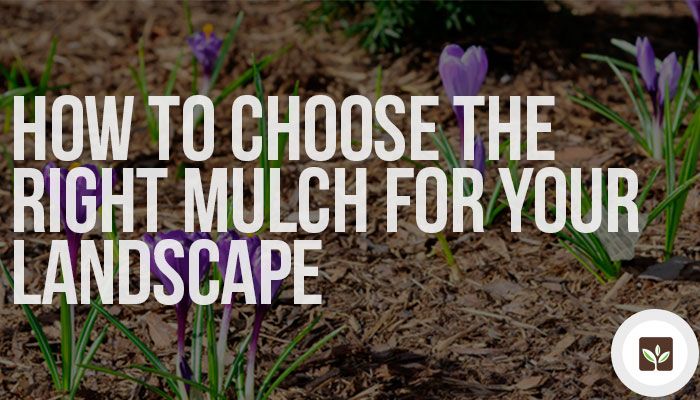There are dozens of types of mulch you can use in your landscape, but which is the right choice? The best type of mulch will depend on many factors, including where it will be used, how fast it decomposes, the look and texture you want, and much more. Here's a guide to help you choose the most appropriate mulch. Organic Mulch Organic mulch is usually best over inorganic options like gravel because it decomposes over time and adds nutrients to the soil. Organic mulch shouldn't be used everywhere. In low areas that stay damp, an organic mulch can retain too much water. This can encourage pests and it can cause plants to rot. Each type of organic mulch can accomplish different things, though. To encourage plant growth... Choose an aged organic mulch. This can improve the soil in your garden bed and encourage plant growth. This mulch, which has partially decomposed wood, will keep breaking down and add nutrients to your soil. To control weeds... Look for fresh mulch such as pine bark mulch, cedar mulch, or wood chips. This type of mulch can freshen the appearance of your flowerbeds, but it should only be used if you don't need to improve the soil. This makes it a good choice for mulching around shrubs and trees. It has not started to decompose yet like aged mulch so it will last longer. For long-lasting color... With most organic mulches, the color will turn gray after a year or even sooner. Mulch colored with a vegetable-based dye will offer very long-lasting color. This type of mulch has a red, red-brown, gold, or black color that can last for up to 3 years. For the longest life... If you want an organic mulch that will last as long as possible, a chunky mulch like pine bark nuggets is the best solution. The larger the pieces of bark, the longer the mulch will last before decomposing into smaller pieces. Fine mulch and shredded bark like hardwood, cypress, and cedar can decompose fairly quickly. If you choose large chunk mulch, you can expect it to last for 2-3 years. Inorganic Mulch Rock and gravel can be a good choice for some applications. If you have a garden area that is prone to getting washed out, such as near a downspout, it's a good idea to use inorganic mulch to stop erosion. Inorganic mulch can also be the best choice for low areas of your landscaping that can stay too damp with organic mulch. There are downsides with inorganic mulch. It won't add nutrients to your soil and it's not easy to switch out, even though it does last for a long time. Rock mulch can also get very hot. This can bake shallow roots, especially in sunny areas of the lawn. Need advice on choosing the right mulch? Not sure where to start? GetMulch.com can find a professional mulch installer that can help you choose a mulch based on where it will be installed and the types of plants you have.
How to Choose the Right Mulch for Your Landscape
There are dozens of types of mulch you can use in your landscape, but which is the right choice? The best type of mulch will depend on many factors, including
